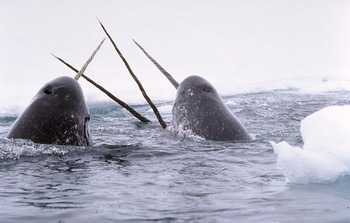Kategorie: News
Seismic testing disrupts whale behaviour
 |
National Institute of Standards and Technology |
A report prepared for Greenpeace Nordic, prepared by not-for-profit organisation Marine Conservation Research International highlights the alarming fact that seismic testing conducted by the oil industry can have a significant impact on the lives of whales.
In 2008 to 2010, researchers observed that the narwhals off Greenland were not making good time in their travels. Due to late departures, they were frequently overtaken by the winter season and thus they would be trapped by the emerging ice. As a result, many drowned as they could not get to the surface to breathe.
In addition, there are more and more instances of strandings. The main cause of these is the seismic testing done by the oil industry, taking place off Greenland and the Arctic.
In seismic testing, ships fire seismic airguns into the seabed to locate oil deposits (which would reflect back the sound waves). Imagine explosions measuring 259 decibels (eight times as loud as the sound of a jet plane taking off) taking place every ten seconds, 24 hours a day. All this violently jars the underwater realm, producing a pandemonium.
An American study in 2004 states that such sounds can be heard almost 3,000 kilometres away. In the oceans, sound spreads out in all directions, affected by factors like temperature and pressure. Whale songs can travel for kilometres, but are hardly heard near sites where seismic testing is being conducted. According to the report – which also summarises several studies done in recent years – there are considerably less whale songs heard within a radius of 200 kilometres of seismic testing sites.
Whales use sound to navigate, communicate, respond to attacks and seek food. If there is seismic testing, the whales may temporarily lose their hearing. For instance, the hearing of beluga whales would be affected if they are as close as a kilometre away from a seismic testing site. Whales that encounter such areas would shun them. As a result, they may avoid some trails or feeding areas that they used to frequent. In time, this may lead to less food sources and communication, and even a lower birth rate.
Greenpeace has been calling for a halt to seismic testing using seismic airguns, at least until more research has been done into its long-term consequences on whales. The short-term consequences, on the other hand, are already clearly in evidence.
In addition, Greenpeace is also calling for special zones where seismic testing is prohibited, for those species and regions that are particularly vulnerable. This is especially necessary for the Arctic, one of the last remaining intact ecosystems on our planet.
Link to the study.